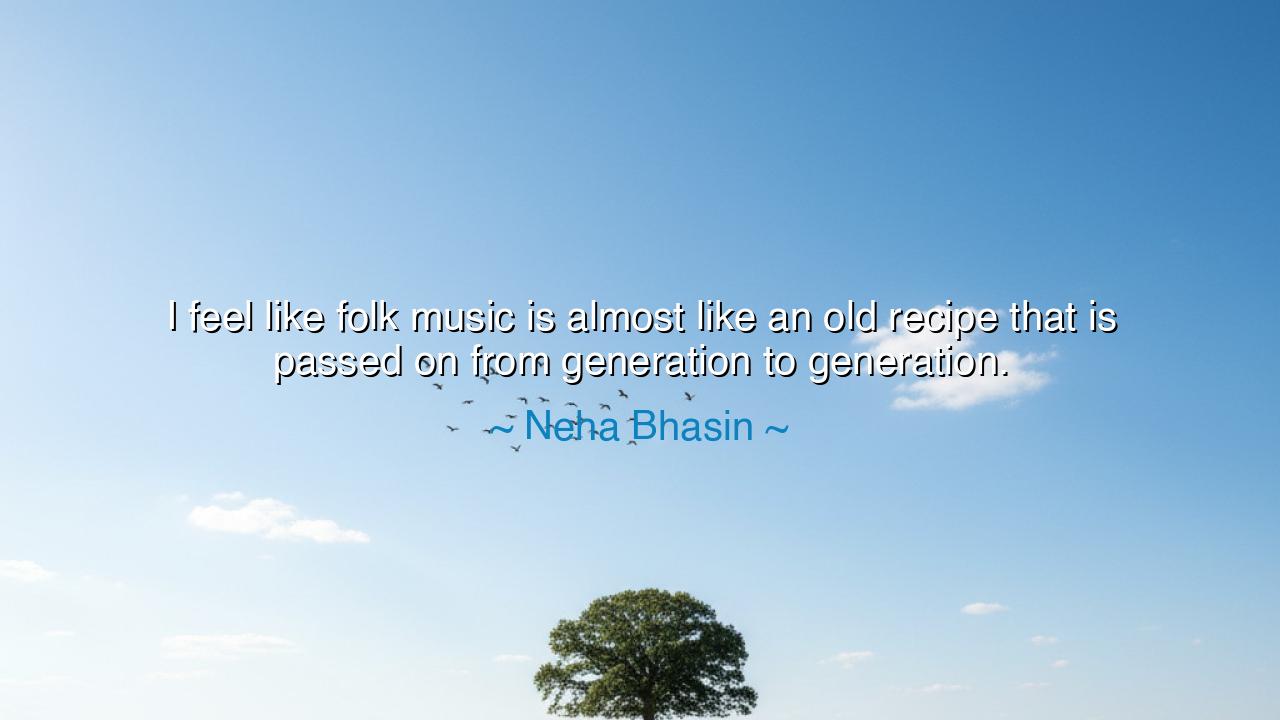
I feel like folk music is almost like an old recipe that is
I feel like folk music is almost like an old recipe that is passed on from generation to generation.






Hear the words of Neha Bhasin, who said: “I feel like folk music is almost like an old recipe that is passed on from generation to generation.” In this gentle yet profound thought lies a truth older than nations, older than kings: that music, like food, nourishes the soul, and that its deepest forms are carried not by books or records alone, but by memory, tradition, and the loving hands of those who came before us.
Folk music is indeed like a recipe—crafted not in palaces or academies, but in kitchens and fields, by ordinary people who sang their joys, their griefs, and their prayers. Just as a recipe is never written exactly the same in every house, so folk songs change as they pass from one singer to the next. A word may shift, a melody may bend, but the essence—the flavor of the song—remains. It is not perfection that keeps it alive, but transmission: the act of giving, of sharing, of remembering.
History bears witness to this. The African American spirituals of the 19th century were sung in the fields, carrying secret meanings and codes for escape along the Underground Railroad. These songs, like recipes, were passed mouth to mouth, voice to voice, surviving without paper, without notation. They were preserved because each generation took them in and gave them forth. And when the world finally recognized their power, they became the foundation for gospel, jazz, blues, and much of modern music. Like an old dish that adapts but never dies, these songs nourished countless generations.
Consider also the epic singers of India, who for centuries carried the stories of the Ramayana and Mahabharata through song. These were not merely performances but inheritances, given from teacher to disciple, family to family, like a pot of stew always kept simmering, enriched by each hand that stirs it. Neha Bhasin, in her reflection, honors this ancient truth: that folk music is not created anew each time, but remembered, repeated, and renewed through the faithful passing down of tradition.
The lesson is this: we are all custodians of memory. Just as one generation teaches the next how to make bread, how to season the curry, how to fold the dough, so must we teach the songs, the stories, the rhythms that make us who we are. To neglect them is to let the chain break, to starve the soul of future generations. To preserve them is to ensure that our people, our culture, our heart itself, lives on beyond us.
Practically, this means we must listen to the old songs, not merely as curiosities but as treasures. Sing them with children. Record them not only in machines but in memory. Learn them not with the coldness of scholars, but with the warmth of family. And just as with recipes, do not be afraid to add your own spice, your own flavor, for folk music is living—it welcomes change, as long as the essence remains.
Thus, Neha Bhasin’s words are not mere metaphor, but a call to remembrance: “Folk music is almost like an old recipe passed on from generation to generation.” Let us then take up the recipes of our ancestors, both in food and in song. Let us taste them, sing them, live them, and pass them on. For in this passing lies the immortality of culture, and in this immortality lies the nourishment of the human spirit.






AAdministratorAdministrator
Welcome, honored guests. Please leave a comment, we will respond soon